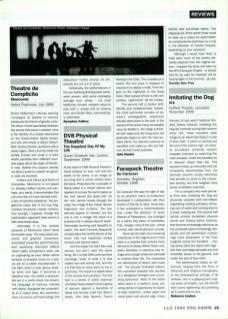Simon McBurney's virtuoso opening monologue on aspects of memory introduces the theme of genetic roots. The show moves seamlessly between two stories that travel in parallel: what is the identity of a corpse discovered on the Austro-Italian Alpine border, and who and where is Alice's father? Both stories involve questions about racial origins. Alice's journey leads her across Europe and ends in a town where scientists from different countries argue about the origin of Neolithic man. Neither the corpse's identity nor Alice's quest to unearth her genetic roots are resolved.
Unlike Lucie Cabrol and Street of Crocodiles, Mnemonic is not based on already crafted stories and perhaps, as a result, it demonstrates that common flaw of much devised work: a lack of narrative substance. The programme notes talk of the way fragmentary structures imitate memory. True enough, I suppose, though this postmodern argument does seems a little tired these days.
Ultimately it is the stylistic panache of Mnenomic which takes the breath away. The exquisitely economic and graceful movement, dovetailed ensemble performances, and surprising technical effects which typify Complicite's work, are as captivating as ever. When actors dressed in anoraks climb on a bed, we are on a bleak mountainside in the Alps; when a chair grows skeletal arms and legs, it becomes a Neolithic man. Our belief is absolute. We are in a world where the dreamlike language of memory meshes with reality. Alongside the vulnerability of a naked body, the sophistications of science and technology (the ubiquitous mobile phone) sit prosaically but not out of place.
Individually, the performances in this pre-Salzburg showing were somewhat uneven, with some noticeably stronger than others – not least McBurney himself, stripped naked to play both a corpse and an anxious lover, and Stefan Metz, mesmerisingly watchable.

